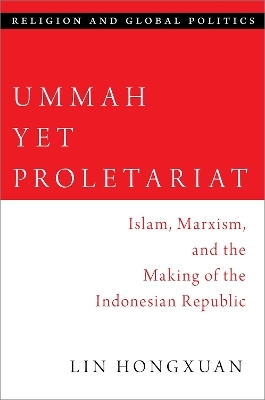
Ummah Yet Proletariat
Islam, Marxism, and the Making of the Indonesian Republic
Seiten
2023
Oxford University Press Inc (Verlag)
978-0-19-765738-6 (ISBN)
Oxford University Press Inc (Verlag)
978-0-19-765738-6 (ISBN)
From 1965 to 1966, at least 500,000 Indonesians were killed in military-directed violence that targeted suspected Communists. Muslim politicians justified the killings, arguing that Marxism posed an existential threat to all religions. Since then, the demonization of Marxism, as well as the presumed irreconcilability of Islam and Marxism, has permeated Indonesian society. Today, the Indonesian military and Islamic political parties regularly invoke the spectre of Marxism as an enduring threat that would destroy the republic if left unchecked.
In Ummah Yet Proletariat, Lin Hongxuan explores the relationship between Islam and Marxism in the Netherlands East Indies (NEI) and Indonesia from the publication of the first Communist periodical in 1915 to the beginning of the 1965-66 massacres. Lin demonstrates how, in contrast to state-driven narratives, Muslim identity and Marxist analytical frameworks coexisted in Indonesian minds, as well as how individuals' Islamic faith shaped their openness to Marxist ideas. Examining Indonesian-language print culture, including newspapers, books, pamphlets, memoirs, letters, novels, plays, and poetry, Lin shows how deeply embedded confluences of Islam and Marxism were in the Indonesian nationalist project. He argues that these confluences were the result of Indonesian participation in networks of intellectual exchange across Asia, Europe, and the Middle East, of Indonesians "translating" the world to Indonesia in an ambitious project of creative adaptation.
In Ummah Yet Proletariat, Lin Hongxuan explores the relationship between Islam and Marxism in the Netherlands East Indies (NEI) and Indonesia from the publication of the first Communist periodical in 1915 to the beginning of the 1965-66 massacres. Lin demonstrates how, in contrast to state-driven narratives, Muslim identity and Marxist analytical frameworks coexisted in Indonesian minds, as well as how individuals' Islamic faith shaped their openness to Marxist ideas. Examining Indonesian-language print culture, including newspapers, books, pamphlets, memoirs, letters, novels, plays, and poetry, Lin shows how deeply embedded confluences of Islam and Marxism were in the Indonesian nationalist project. He argues that these confluences were the result of Indonesian participation in networks of intellectual exchange across Asia, Europe, and the Middle East, of Indonesians "translating" the world to Indonesia in an ambitious project of creative adaptation.
Lin Hongxuan is Senior Tutor in the Department of Southeast Asian Studies at the National University of Singapore. In 2022, he was a Visiting Fellow at the Saw Swee Hock Centre for Southeast Asian Studies, London School of Economics and Political Science. A scholar of Indonesian history, his work has been published in Southeast Asian Studies, Studia Islamika, Positions: Asia Critique, and New Mandala.
Introduction
Chapter One: Incubating Communism in the Netherlands East Indies
Chapter Two: New Modes of Movement
Chapter Three: The Revolutionary Consensus
Chapter Four: A Critical Ummah, A Conscious Proletariat
Epilogue: NASAKOM and Its Proponents
Conclusion
| Erscheinungsdatum | 05.08.2023 |
|---|---|
| Reihe/Serie | RELIGION AND GLOBAL POLITICS SERIES |
| Zusatzinfo | 11 black and white figures, 1 map |
| Verlagsort | New York |
| Sprache | englisch |
| Maße | 242 x 162 mm |
| Gewicht | 662 g |
| Themenwelt | Geisteswissenschaften ► Geschichte ► Regional- / Ländergeschichte |
| Geisteswissenschaften ► Religion / Theologie ► Islam | |
| ISBN-10 | 0-19-765738-9 / 0197657389 |
| ISBN-13 | 978-0-19-765738-6 / 9780197657386 |
| Zustand | Neuware |
| Haben Sie eine Frage zum Produkt? |
Mehr entdecken
aus dem Bereich
aus dem Bereich
Erinnerungen
Buch | Softcover (2024)
Pantheon (Verlag)
CHF 22,40


